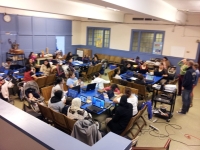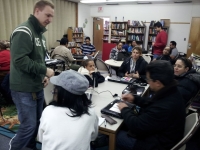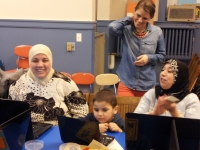Xenos Isle Language Learning Game
Boston Public Library, Mass.
Innovation Synopsis
Boston Public Library collaborated with Learning Games Network on introducing community-based, English-language gaming platform to Spanish speakers in 7 pilot branches. Participants learned digital literacy skills while learning English and interacting with other members of the community.
Challenge/Opportunity
As immigrants increasingly turn to libraries for career counseling and civic resources during uncertain economic times and as the nation debates and contemplates new mechanisms for immigrants to work legally and/or become naturalized U.S. citizens, we have an opportunity to offer new programs that serve increasingly diverse visitor populations. In 2012, the Boston Public Library embraced an opportunity to collaborate with the Gates Foundation, Learning Games Network, and the San Francisco Public Library on the development of an innovative technology-based and blended learning program that’s intended to be to an effective alternative to the traditional ESL programs offered by community colleges and language centers, which are often over-subscribed or out of reach for many immigrants. Our goal in participating in the development of the program has been to understand the staffing and budget implications, as well as how we can effectively partner with organizations that are producing new digital media content and support services for distribution through libraries. By running pilot programs in our branches, we’ve seized on a valuable opportunity to learn how we can better support the ESL needs of our Hispanic visitors. We share the Gates Foundation’s vision to enable Hispanic adult learners to realize the promise of the “American Dream” and contribute to larger global social and economic development as members of society who actively participate in their communities.
Key Elements of Innovation
Over the past year, our librarians have worked with Learning Games Network to introduce Xenos, an online game-based ESL learning experience to visitors. Game-based learning provides unique opportunities for learners to experiment, collaborate, communicate, and compete with others as they use and develop their listening, reading, speaking, and writing skills. Xenos aims to increase English language learning by: — Providing a free experience where learners can play and interact anytime, anywhere; — Motivating learners to practice English naturally with a community of learners in an immersive virtual environment and during weekly play sessions in our branches; — Supporting learners as they grow social, academic, and vocational vocabulary through gameplay and completing purposeful tasks using a variety of engaging curricular content; and — Improving learning outcomes by providing immediate feedback, reports to learners and coaches, and prescribing differentiated learning paths based on performance. We ran a pre-pilot of the program at two branches in fall 2012 in advance of a full evaluation pilot currently being managed in seven branches in winter/spring 2013. Approximately 40 of our Hispanic visitors participated in the fall; roughly 125 participants have started the current program. Note: Learning Games Network has supplied all program participants with laptops they can use in our branches, at WiFi “hotspots” in the community, and at home, if they have service); The Learning Games Network manages weekly “play and discussion” sessions with our branch librarians. Ultimately, the goal is to train librarians and volunteers to organize weekly activities and moderate conversations, all of which have been designed to introduce and provide context for the online games, many of which are designed to be played by multiple players.
Achieved Outcomes
While unpublished, the project team observed gains in language skills between pre- and post-testing during the autumn program (Note: RTI International, an external evaluation team, administered the BEST-Plus English Language Proficiency Test at the start and end of the pre-pilot as part of its methodology to ensure proper testing instruments for the full evaluation pilot that is running this winter/spring; a summative evaluation will be published in late summer/early autumn 2013). Results of the pre-pilot program also suggest a high degree of engagement and motivation among participants. An overwhelming majority of participants indicated that they would recommend Xenos to their friends; we believe this word-of-mouth to our high participant commitments for the current program. Although we are excited to be reaching a diverse population of Hispanic visitors across all branches, we’re especially thrilled to be supporting almost 30 young mothers at our branch in East Boston; each week, many of these mothers arrive with babies in strollers or their young children, who play along the sides of the meeting room as their moms participate in the program. If not for Xenos, they would be hard-pressed to participate in another ESL program. In addition to supporting ESL learning, the Xenos program is providing valuable access to and experience with digital technologies. Our low-income, at risk Hispanic participants are developing familiarity with technologies not generally at their disposal. We see participants becoming more confident as the program continues, enabling them to take advantage of our larger suite of digital content and services.



